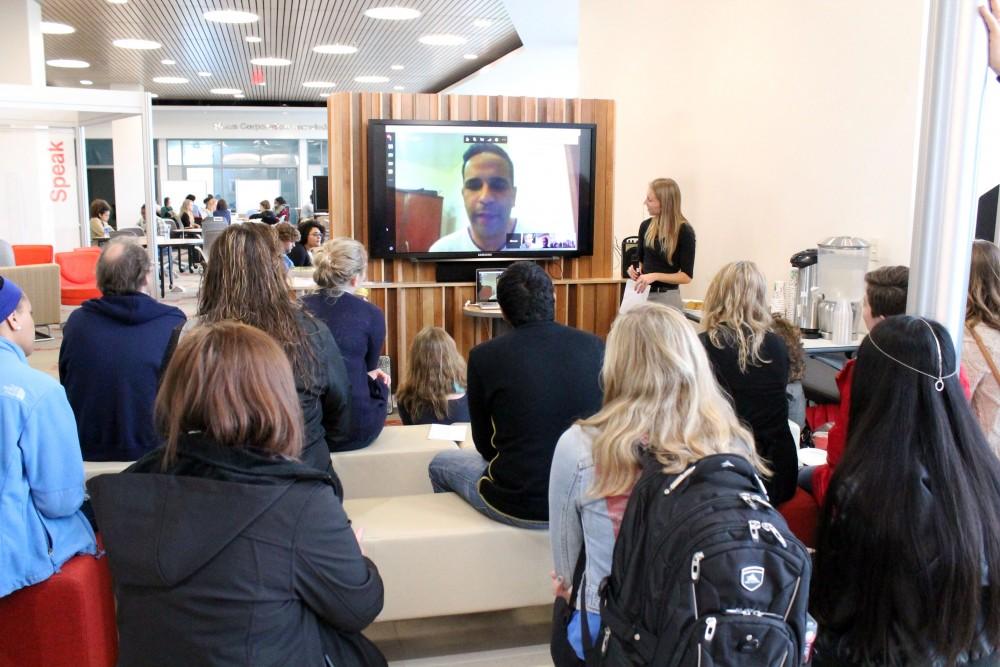Global Lakers share their experiences

GVL / Emily Frye Religious Tolerance Skype
Oct 20, 2014
Lakers studying abroad were part of a video conversation with an audience at Grand Valley State University’s Learning Alcove in the Mary Idema Pew Library on Friday.
The audience spoke to the panel about religious tolerance and the religious climates in the countries where they are studying. This panel was a part of a series surrounding the art exhibit, Religious Tolerance: Islam in the Sultanate of Oman.
The panel included students currently studying in Palestine and Jordan, one who recently returned from Oman, and a former GVSU international student currently living in Jerusalem.
Several of the students spoke about how religion played a huge role in their daily lives abroad.
Kyle Meppelink is living in Bir Zeit on the West Bank of Palestine, a historically Christian village where now many Christians and Muslims live.
Meppelink said that both Muslim and Christian days of prayer and rest affect the flow of life in Bir Zeit.
“Something I found interesting about life here was the concept of weekends,” Meppelink said. “So you have the Christians who own some of the shops here who close their shops on Sundays. But then you have the Muslims who close their shops on Fridays.”
Meppelink said he plans his shopping around whether the shop owner is Christian or Muslim.
He added that because of the different traditions, most students have school Monday through Thursday and then again on Saturday.
“It’s very interesting to see how much religion influences the culture and how much religion influences the language as well,” Meppelink said.
David Leestma said religion plays a significant part in daily life in Amman, Jordan.
Leestma said that the call to prayer, starting at 5 a.m. is a way to keep track of time throughout the day. He said that despite its significance in everyday life, he believes that there are more pressing issues than religion.
“I think there are more salient issues in Jordan than religion,” Leestma said. “Ethnicity seems to play a very large role in society here. So whether or not you’re Jordanian, Palestinian, Syrian or Iraqi tends to matter a bit more than religion.”
Leestma said he has not had many difficulties with being a different religion than most Jordanians.
“I found that generally speaking, Jordanians and Muslims have a better perception of Christians and westerners than someone in the U.S. might have of a Muslim or an Arab or a Middle Easterner,” he said. “Most people have a pretty nuanced view of who I might be and where I am from.”
Meagan Roche studied in Oman and Jordan. She said that despite the fact that religion plays a significant role in Oman, it is not broadcasted.
“Religion is really important in how people conduct their lives and how you move forward,” Roche said. “At the same time, people don’t talk about it so much, it’s just something that you do.”
Ahmad Shiber, a former international student at GVSU, experienced fellow Lakers assuming he was religious because of where he was from.
“I was asked at GVSU why I am not covering my hair, because I am Muslim,” Shiber said. “I was shocked at the beginning, like, ‘what do you mean, I am a guy.’”
Shiber said he was happy to answer the questions because he realized they came from a place of curiosity rather than spite. He said that it is better to not assume that someone is religious based off of where they are from.























